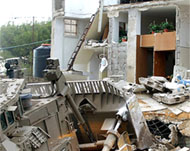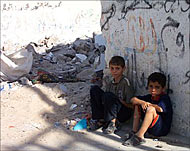Israel to end punitive demolitions
The Israeli occupation army will stop its punitive policy of destroying Palestinian homes after a recommendation by a military panel, but it will not halt large-scale demolitions such as those that have taken place in Gaza.

The decision by Israeli Defence Minister Shaul Mofaz on Friday came after a military committee recommended against the illegal and controversial policy, under which more than 4240 Palestinians have lost their homes during the most recent intifada.
The panel concluded that “no effective deterrence was proven” by demolishing Palestinian homes and that in fact the damage far outweighed the benefits to the state of Israel.
Compensation urged
The finding came as no surprise to human rights groups such as B’Tselem, which have long advocated against home demolitions and urged compensation for Palestinians whose homes have been demolished as a result of this policy, which dates back to 1967.
“Demolishing their homes is a clear case of collective punishment, and violates the precept that a person should not be punished for the acts of others. Thus, the practice is illegal, regardless of its effectiveness,” said the group in a news release.
30,000 made homeless
Absent from the army’s recommendation were demolitions in Gaza, where nearly 30,000 Palestinians have been made homeless by Israeli armoured bulldozers over the past four years.
 |
|
An Israeli military bulldozer |
The Israeli decision applies only to what are known as punitive demolitions – homes demolished to punish the families and neighbours of Palestinians suspected of involvement in attacks against Israelis – said Sohad Saqallah of B’Tselem.
Punitive demolitions make up less than 15% of Israel’s demolitions of Palestinian homes, says the group.
According to a report the group published in November, the overwhelming majority of homes demolished by the Israeli army are in the framework of what Israel calls “clearing operations” such as those that have taken place in Rafah.
Gaza offensive
The southern Gaza Strip refugee camp, which is overseen by the UN Agency for Palestine Refugees (UNRWA), accounts for the bulk of such operations, most recently in a bloody May 2004 offensive codenamed Operation Rainbow that resulted in 59 Palestinian deaths.
|
“The really substantial number [of demolitions] has been collective punishment in Rafah and Jenin and Khan Yunus” |
“UNRWA’s major concern has not been with targeted demolitions but with widescale demolitions that have left almost 30,000 people in the Gaza Strip homeless over the last four years,” said UNRWA spokesperson Paul McCann.
“The really substantial number [of demolitions] has been collective punishment in Rafah and Jenin and Khan Yunus, not these sort of specific punishment exercises.”
Israeli authorities have in the past cited security concerns and arms-smuggling tunnels as their justification for raiding Rafah and their mass demolition of homes there. But a Human Rights Watch report published in October said the Israeli arguments “crumble under scrutiny”, accusing Israel of systematically expelling tens of thousands of Palestinians from the border area in the southern Gaza Strip.
Creating a buffer zone
The New-York based group says the Israeli military has razed and displaced entire neighbourhoods to widen a so-called buffer zone along the densely populated border between Egypt and the Gaza Strip.
 |
|
The policy of punitive destruction |
An Israeli army spokesperson said the army’s decision to stop punitive demolitions can be changed at any time. “If an extreme change in circumstances takes place, the aforementioned decision regarding the policy will be re-examined.”
The spokesperson also said the policy was part of Israel’s “obligation and right to defend itself,” contrary to the view of international law.
The Fourth Geneva Convention prohibits an occupying state from destroying the property of civilians in occupied territory except where absolutely militarily necessary and absolutely prohibits the use of collective punishment.
The Israeli newspaper Haaretz criticised the demolitions in an editorial on Friday, saying they were evidence of the Israeli army’s “helplessness, and the inability to quell the intifada by military means”.